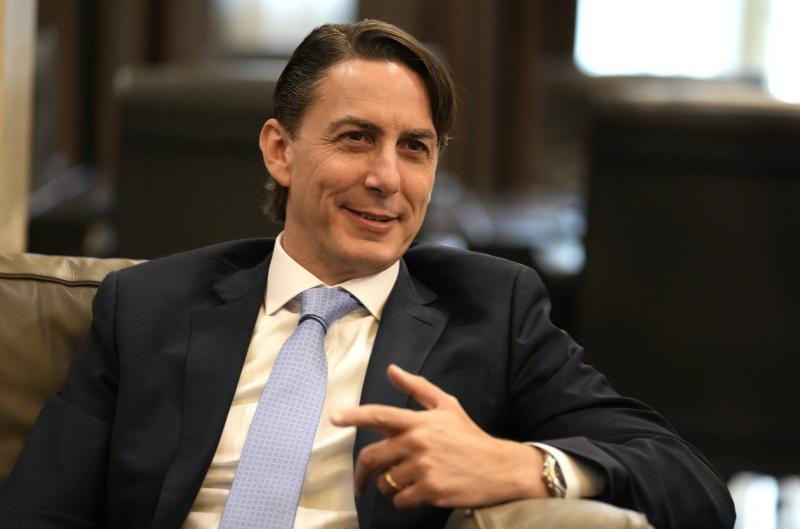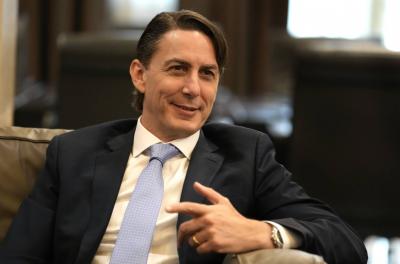What Hezbollah Secretary-General Hassan Nasrallah indicated last Monday regarding the possibility of launching a workshop to define Lebanon's land borders with occupied Palestine was not an empty gesture. It is connected to what was taking place away from the limelight, aimed at finding a solution to the "Israeli dilemma," which is not the presence of resistance in the south, but rather the two tents erected by the resistance in the Shebaa Farms area.
Information from "Al-Akhbar" indicated that serious discussions on this matter began several months ago, after the Israelis requested a secret meeting between military delegations from Israel and Lebanon, under the auspices of the commander of the International Forces operating in the south, to discuss the border file, outside the framework of the tri-partite meetings held regularly in Naqoura to discuss violations of Resolution 1701.
After political, security, and military consultations, Lebanese delegation head Brigadier General Munir Shihadeh was tasked with selecting two members from his military delegation involved in the southern border file to attend the meeting presided over by the commander of the International Forces with one of his assistants, the head of the Israeli delegation, and two of his assistants.
Before the meeting, U.S. special envoy Amos Hochstein arrived in Beirut at the end of August, conveying to Lebanese officials that he was commissioned by his government to manage negotiations to address the pending issues on the land borders, similar to the maritime border negotiations. Hochstein expressed great enthusiasm at that time and spoke about the willingness of the enemy government to pursue negotiations until the step was completed, asserting that Israel was prepared to discuss everything Lebanon requested, ranging from point B1 in Naqoura to the occupied Shebaa Farms. He was explicit that Tel Aviv was eager to finalize an agreement to exchange the evacuation of northern Ghajar for the removal of the two tents set up by Hezbollah in the occupied Shebaa Farms area, and was candid about the "great embarrassment" faced by the Israeli army due to its inability to remove the tents by force, and the enemy's desire to resolve this crisis even if the cost involved addressing the pending land issues.
In the meeting that brought Hochstein together with Prime Minister Najib Mikati at the government headquarters, the latter confirmed that Lebanon – including Hezbollah – wanted to reinforce stability, hasten exploration activities in the sea, and address economic and living crises, stating that no one in Lebanon wishes for a war with Israel at this time. Mikati told Hochstein: "You always talk about Hezbollah's weapon and its presence in the south, and you know that as long as there are Lebanese lands occupied, no one is willing to discuss the issue of the party’s arms." At that point, the U.S. envoy asked: "Well, what if Israel agreed to evacuate all points that Lebanon considers occupied? Do you guarantee Hezbollah's withdrawal from the borders and that there would be no excuse left for justifying its military presence and armament?" Before hearing the answer, Hochstein remarked: "Do you think Hezbollah is prepared to proceed with what we’re discussing now, as happened with the maritime agreement?" To which he received the reply that "Lebanon is ready for the next step, and you must prove that Israel is ready to withdraw from all occupied areas without leaving any loopholes." Hochstein departed that day, promising to return soon after obtaining responses from Israel.
Later, the "secret military meeting" took place, after which the Lebanese delegation concluded that the Israeli side showed great interest in finalizing the exchange of northern Ghajar for the tents. There was a detailed discussion, before it was agreed to keep the meeting's content secret. The Americans and the international forces emphasized the necessity of not leaking, as Benjamin Netanyahu's government would then find itself in a significant embarrassment if it appeared to be conceding to Hezbollah.
"Al-Akhbar" learned that after the news was published, amidst rising criticisms in Israel of the right-wing government, contact was made between Lebanese officials and Hochstein to inquire if there were any updates and whether he had scheduled trips to the occupied entity and Lebanon. He responded that there were many developments and pointed to "the damage of the leak," indicating that Netanyahu's government was prepared for a quick settlement through a mechanism that would not portray it as weak, whereas Hezbollah sought to "humiliate" the Israeli government not only by accepting its terms for the removal of the tents but also in how the matter would be executed. Hochstein concluded that there was little hope for resuming discussions on the matter soon.
In parallel, a Lebanese issue arose regarding Brigadier General Shihadeh's retirement. Consequently, there was no head for the Lebanese negotiating military delegation. Contacts were made to avoid this vacancy, and several solutions were proposed, including promoting him to the rank of general, which would allow him to extend his service in the military, similar to what happened with the acting director-general of General Security, General Elias Bissari. However, Defense Minister Maurice Sleem refused to sign such a decree and rejected the idea of calling Shihadeh from reserve duty for a mission that constitutes a necessity for Lebanon's national security. It is worth noting that Sleem's rejection of the extension or recall from reserve does not pertain specifically to Shihadeh but is to prevent any such precedent that could be invoked for Army Chief General Joseph Aoun when he reaches retirement age early next year. Thus, the situation has resulted in a halt to the process, especially since the idea of tasking Shihadeh with the mission from outside the military implies hiring him as a civilian, a principle that contradicts the agreement previously made with President Michel Aoun to restrict any Lebanese delegation discussing the border file with the enemy to military personnel who have a technical agenda, and not appointing any civil or political employee to avoid giving negotiations a political dimension.
In practice, the enemy initially cited the leak and postponed a meeting that was meant to set a proposal for implementing the agreement, and then the retirement of Brigadier General Shihadeh has now prevented Lebanon from sending a delegation for negotiations. This situation not only reflects a technical problem but also hides the fact that the enemy was not truly ready for this step; otherwise, how can one explain the position of a "state" claiming to seek a strategic agreement, then deciding to backtrack due to news published in a newspaper?
In essence, there are many details regarding the proposed agreement and the specific implementation measures related to northern Ghajar on one side and Naqoura on the other, in addition to a more complicated discussion concerning the Shebaa Farms and the disputed points along the land border. This topic deserves its own discussion.




